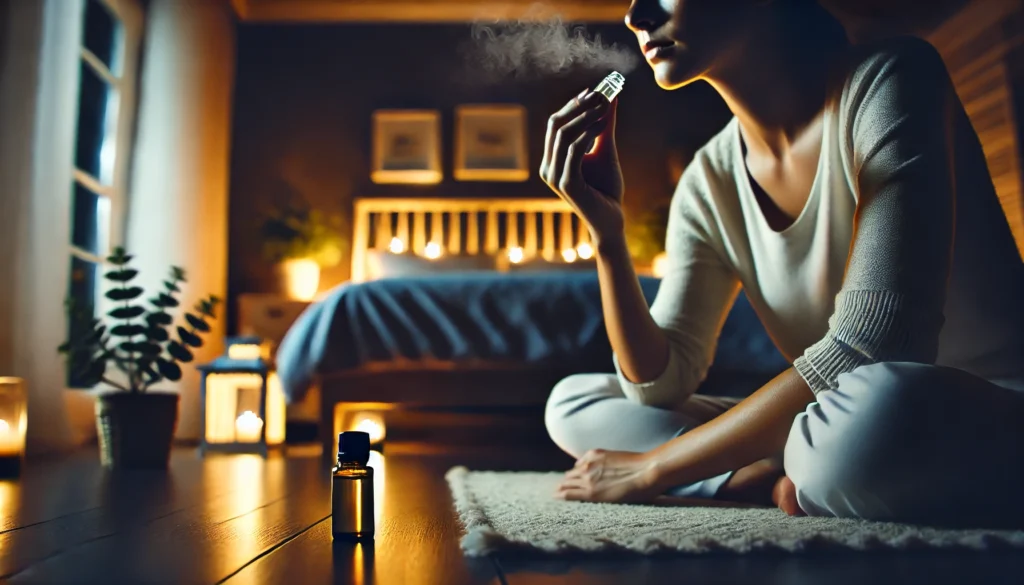Aromatherapy, a practice that dates back thousands of years, involves using essential oils derived from plants to improve physical and psychological well-being. These oils contain volatile compounds that interact with the limbic system in the brain—the area responsible for emotions and memory—thereby influencing mood and relaxation.
Historical Roots of Aromatherapy
The use of aromatic plants for healing and relaxation dates back to ancient civilizations. Egyptians, Greeks, and Romans employed these techniques for religious ceremonies and therapeutic purposes. Understanding this historical context can provide insight into how these practices evolved and their significance in modern times.
The Limbic System and Its Role in Sleep
The limbic system, often referred to as the emotional brain, plays a crucial role in our response to scents. When essential oils are inhaled, they stimulate the olfactory nerves, which are directly connected to the limbic system. This connection explains why certain aromas can trigger emotional responses and influence sleep patterns.
Neurotransmitters and Sleep Regulation
Research suggests that certain scents can trigger the production of neurotransmitters like serotonin and dopamine, which play a critical role in regulating mood and sleep. These neurotransmitters help stabilize mood and promote a sense of well-being, which is essential for achieving restful sleep.
Sedative Properties of Essential Oils
Some essential oils contain compounds that possess sedative properties, such as linalool and terpene alcohols, which can help reduce anxiety and induce sleep. Understanding the chemical composition of these oils can assist in selecting the most effective ones for enhancing sleep quality.
Scientific Studies Supporting Aromatherapy
A study published in the journal Evidence-Based Complementary and Alternative Medicine found that participants exposed to lavender essential oil before bedtime experienced improved sleep quality and increased duration of sleep. This indicates that aromatherapy could be a valuable tool in addressing insomnia and other sleep-related issues. Further studies continue to explore the efficacy of different oils and application methods in promoting sleep.
You May Also Like: Benefits of Consistent Sleep Schedules Explained

What Aromatherapy Oil Is Good for Sleep?
When considering aromatherapy for sleep, it’s important to choose oils known for their calming and sedative effects. Here are some of the most effective oils for promoting restful slumber:
Lavender
Lavender is perhaps the most widely recognized essential oil for sleep aromatherapy. Known for its soothing scent, lavender has been shown to reduce anxiety and improve sleep quality. Its calming effects make it a staple in many nighttime rituals.
The Chemical Profile of Lavender
Lavender oil contains linalool and linalyl acetate, compounds known for their calming properties. These components work synergistically to provide a sense of tranquility, making lavender an ideal choice for those seeking to unwind before bed.
Research on Lavender’s Sleep Benefits
Numerous studies have demonstrated lavender’s efficacy in promoting relaxation and improving sleep quality. For instance, research has shown that lavender can reduce the time it takes to fall asleep, increase the duration of sleep, and enhance overall sleep quality.
Incorporating Lavender into Your Routine
Lavender can be used in various forms, such as essential oil diffusers, pillow sprays, or even as an ingredient in bath products. Experimenting with different methods can help determine which approach best suits your preferences and sleep needs.
Chamomile
Chamomile oil, particularly Roman chamomile, is another powerful sleep aid. Its mild sedative effects help ease tension and promote relaxation, making it ideal for those struggling with stress-induced insomnia.
The Soothing Elements of Chamomile
Chamomile contains apigenin, a compound that binds to receptors in the brain, promoting relaxation and sleepiness. This makes chamomile an excellent choice for individuals dealing with anxiety and stress-related sleep disturbances.
Chamomile in Sleep Research
Scientific studies have highlighted chamomile’s effectiveness in improving sleep quality and reducing anxiety. Its gentle nature makes it suitable for a wide range of individuals, including those with sensitive skin or allergies.
Creative Uses for Chamomile
Chamomile can be incorporated into your sleep routine through teas, essential oil diffusers, or topical applications. Exploring these options can help tailor your experience to achieve optimal relaxation and rest.
Bergamot
Bergamot essential oil, extracted from the rind of the bergamot orange, is known for its ability to reduce stress and anxiety. Its citrusy scent can uplift the mood while simultaneously calming the mind, creating an ideal environment for sleep.
The Unique Aroma of Bergamot
Bergamot’s distinctive citrus scent is both uplifting and soothing, making it an excellent choice for those who need to unwind after a long day. Its aroma can help clear the mind and prepare the body for restful sleep.
Stress Reduction with Bergamot
Research has shown that bergamot can effectively reduce cortisol levels, the hormone associated with stress. This reduction in stress can facilitate a smoother transition into sleep, improving both sleep onset and quality.
Integrating Bergamot into Nighttime Rituals
Bergamot can be used in diffusers, blended with other calming oils, or applied topically in diluted form. Experimenting with different methods can help you find the most effective way to incorporate bergamot into your sleep routine.
Cedarwood
Cedarwood oil has a warm, woody aroma and contains compounds that have been linked to increased serotonin production. This helps stabilize mood and promotes a sense of calm, facilitating a more restful night’s sleep.
The Calming Effects of Cedarwood
Cedarwood contains cedrol, a compound that acts as a natural sedative. This makes it particularly effective in calming the nervous system and promoting relaxation, essential for achieving restorative sleep.
Research on Cedarwood and Sleep
Studies have indicated that cedarwood can enhance sleep by reducing heart rate and blood pressure, contributing to a more relaxed state. This makes it a valuable tool for individuals experiencing sleep disturbances related to stress or anxiety.
Creative Applications of Cedarwood
Cedarwood can be used in various forms, such as essential oil blends, massage oils, or as a component in sleep-inducing bath products. Exploring these options can enhance your sleep environment and promote better rest.

Incorporating Aromatherapy into Your Sleep Routine
To maximize the benefits of sleep aromatherapy, it’s crucial to integrate these oils into your nightly routine in a way that suits your lifestyle. Here are some practical methods to consider:
Diffusion
Using an essential oil diffuser is one of the most effective ways to disperse calming scents throughout your bedroom. Add a few drops of your chosen sleep-promoting oil to the diffuser before bedtime, and let the gentle mist lull you into a restful slumber.
Choosing the Right Diffuser
There are various types of diffusers available, including ultrasonic, nebulizing, and heat-based models. Selecting the right one depends on your preferences and the size of your space. Each type offers unique benefits, such as varying mist output and coverage area.
Best Practices for Diffusing Oils
To ensure optimal results, it’s important to follow best practices when using a diffuser. This includes using the appropriate amount of oil, cleaning the device regularly, and positioning it strategically in your bedroom to maximize the distribution of the aroma.
Creating a Relaxing Atmosphere
In addition to diffusing essential oils, consider enhancing your sleep environment with soft lighting, calming music, or a comfortable mattress. These elements can work together to create a tranquil space conducive to relaxation and sleep.
Pillow Sprays
Pillow sprays are a convenient option for those who prefer a subtle aroma. Simply spritz a light mist of essential oil-infused water onto your pillowcase before lying down. This creates a soothing ambiance that can help you drift off more easily.
Crafting Your Own Pillow Spray
Creating a personalized pillow spray is a simple and cost-effective way to enjoy aromatherapy. By blending essential oils with water and a mild emulsifier, you can customize the scent to suit your preferences and enhance your sleep experience.
Benefits of Pillow Sprays
Pillow sprays offer several benefits, including ease of use, portability, and the ability to target specific areas of your sleep environment. This makes them an excellent choice for individuals seeking a quick and convenient way to incorporate aromatherapy into their routine.
Enhancing the Sleep Experience
To further enhance the sleep experience, consider pairing pillow sprays with other relaxation techniques, such as meditation or deep breathing exercises. This can help calm the mind and body, creating a more restful state conducive to sleep.
Bath Soaks
Integrating aromatherapy into a warm bath can enhance relaxation. Add a few drops of essential oil to your bathwater and soak for 15-20 minutes before bed. The combination of warmth and soothing scents can help melt away the day’s tension.
Selecting the Right Essential Oils for Baths
When choosing essential oils for bath soaks, consider their therapeutic properties and personal preferences. Oils such as lavender, chamomile, and cedarwood are excellent choices for promoting relaxation and preparing the body for sleep.
Creating a Spa-Like Experience
To create a spa-like experience, consider adding Epsom salts, bath bombs, or dried herbs to your bath. These elements can enhance the soothing effects of the essential oils, providing a luxurious and calming experience before bedtime.
Safety Tips for Using Essential Oils in Baths
It’s important to use essential oils safely in baths to avoid skin irritation. Always dilute the oils with a carrier oil before adding them to the water, and perform a patch test if you’re using a new oil. This ensures a safe and enjoyable experience.
Topical Application
For those who enjoy a more tactile approach, consider diluting essential oils with a carrier oil, such as jojoba or coconut oil, and applying them to pulse points like wrists, temples, and behind the ears. This method allows the oils to be absorbed into the bloodstream, offering prolonged relaxation benefits.
Choosing the Right Carrier Oil
Selecting an appropriate carrier oil is crucial for safe and effective topical application. Options such as almond, jojoba, and coconut oil offer different benefits, including nourishing the skin and enhancing the absorption of essential oils.
Techniques for Topical Application
There are various techniques for applying essential oils topically, including massage, compresses, and rollerball applicators. Each method provides unique benefits, allowing you to tailor the experience to your preferences and needs.
Enhancing Relaxation with Massage
Incorporating essential oils into a massage routine can further enhance relaxation and promote sleep. Consider using gentle, circular motions to apply the oils, focusing on areas of tension or discomfort to release stress and encourage restfulness.

The Future of Sleep Aromatherapy
As interest in natural remedies continues to grow, the field of aromatherapy is poised for further exploration and validation through scientific research. Emerging studies are investigating the broader applications of essential oils in sleep medicine, including their potential role in treating sleep disorders like sleep apnea and restless leg syndrome.
Emerging Research and Innovations
Ongoing research is expanding our understanding of how essential oils can influence sleep and overall well-being. Scientists are exploring new applications and delivery methods, contributing to a more comprehensive understanding of aromatherapy’s potential benefits.
Technological Advancements in Aromatherapy
Innovations in the delivery of aromatherapy—such as wearable diffusers and smart home devices—are also expanding the ways in which individuals can incorporate these techniques into their daily lives. These advancements make it easier than ever to harness the power of aroma sleep.
The Role of Aromatherapy in Holistic Health
As the field of aromatherapy continues to evolve, its role in holistic health and wellness is becoming increasingly recognized. By integrating aromatherapy with other natural practices, individuals can create a comprehensive approach to improving sleep and overall quality of life.
Conclusion
Sleep aromatherapy offers a holistic approach to enhancing sleep quality, drawing on centuries-old practices and modern scientific insights. By integrating essential oils into your nightly routine, you can create a soothing environment that promotes relaxation and restful sleep. Whether you’re a health and wellness coach seeking reliable information for clients, a science journalist translating complex data, or a biohacker optimizing sleep, aromatherapy provides a natural and effective solution worth exploring.
The Transformative Power of Aromatherapy
Incorporating the right essential oils into your bedtime rituals can transform your sleep experience, turning each night into a restorative journey towards better health and well-being. By embracing the benefits of aromatherapy, you can cultivate a sleep routine that supports your physical and mental health.
Practical Tips for Getting Started
For those new to aromatherapy, starting with simple techniques and gradually experimenting with different oils can help you discover what works best for your needs. By keeping an open mind and being willing to explore, you can unlock the potential of aromatherapy to enhance your sleep.
A Call to Embrace Natural Solutions
As we seek to improve our sleep and overall wellness, embracing natural solutions like aromatherapy can provide a valuable tool in our self-care arsenal. By prioritizing sleep and harnessing the power of scent, we can create a healthier and more balanced life.
Further Reading:
The Best Essential Oils for Sleep
Essential Oils That Can Help You Sleep Better
7 of the best essential oils for sleep
Important Note: The information contained in this article is for general informational purposes only, and should not be construed as health or medical advice, nor is it intended to diagnose, prevent, treat, or cure any disease or health condition. Before embarking on any diet, fitness regimen, or program of nutritional supplementation, it is advisable to consult your healthcare professional in order to determine its safety and probable efficacy in terms of your individual state of health.
Regarding Nutritional Supplements Or Other Non-Prescription Health Products: If any nutritional supplements or other non-prescription health products are mentioned in the foregoing article, any claims or statements made about them have not been evaluated by the U.S. Food and Drug Administration, and such nutritional supplements or other health products are not intended to diagnose, treat, cure, or prevent any disease.


